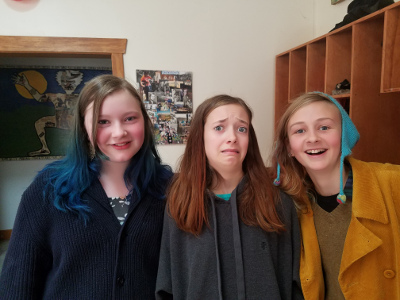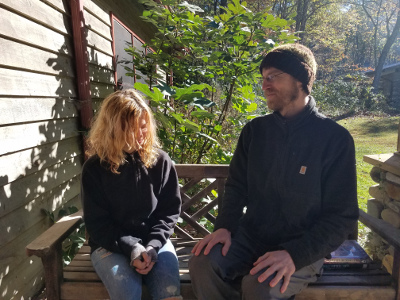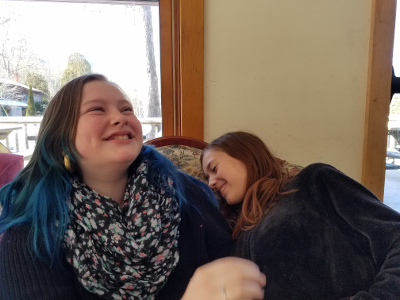How to Start a Mentoring Program at School

Arthur Morgan School is in its final week of the year. Students and staff are busy getting ready for graduation by cleaning, mowing, and weeding the campus. It is a time of celebration and excitement with lots of end of the year activities: a Tourists baseball game, tubing down the river, a mock prom. Our final week is also a time to honor the special relationships we built throughout the year. On Thursday, the last full day of the year, social advisee groups will honor one another in a tradition that highlights what they appreciate most about one another.
Social advising is an important part of AMS. It is a mentoring program that helps middle school students through the difficult period of adolescence. As young adolescents, middle schoolers regularly experience unfamiliar emotions. Its common for them to cycle through anger, depression and even unbridled enthusiasm all in a single afternoon. They often feel confused and out of control as they try to navigate the changes in their bodies and hormones. In addition, the social dynamics of their peer group are continually changing. Two middle schoolers could be best friends one day and mortal enemies the next. It is a confusing and challenging time and many middle schoolers want a mentor to help them get through it.
The Benefits of Peer and Adult Mentoring
In most schools, the job of that mentor would fall on a student’s peers. Seeing adults as distant authoritative figures, young adolescents alternatively ask advice from their friends or classmates. Having a friend to go to during this difficult period is important. Friends validate each others’ experiences. They can ask each other questions without feeling stupid or insecure. They make adolescence less lonely.
 Unfortunately, peer mentorship is also somewhat limited. Since teenagers mature at different speeds and interests vary widely amongst them, peer mentorship sometimes results in the blind leading the blind. Misinformation and bad advice may fuel poor decision making and lead to challenging experiences. Having an adult mentor can be very beneficial as students can rely on an experienced voice that has already gone through adolescence. They can trust that the advice they are receiving comes from one who understands all the consequences of their actions.
Unfortunately, peer mentorship is also somewhat limited. Since teenagers mature at different speeds and interests vary widely amongst them, peer mentorship sometimes results in the blind leading the blind. Misinformation and bad advice may fuel poor decision making and lead to challenging experiences. Having an adult mentor can be very beneficial as students can rely on an experienced voice that has already gone through adolescence. They can trust that the advice they are receiving comes from one who understands all the consequences of their actions.
AMS provides students with adult and peer mentors at the beginning of every school year. Social advising groups, made up of two to three students and a staff member meet every week and talk about their feelings. They might discuss how things are going at home or problems that are coming up with their friends. They may talk about crushes they’re developing or changes they are experiencing in their bodies. The advisor advisee dynamic has the potential to be one of the most rewarding and powerful relationships many of these middle schoolers will ever experience.
Learn More about AMS’s Social Advising Program
How to Build Trust with Young Adolescents
But how can adults effectively build trust with middle schoolers to create a solid mentoring relationship? Young adolescents are in a stage where they are mistrustful of most adults. Experiencing an overwhelming urge to break out from the parent/child dynamic, they want others to see them as competent contributors to their communities. Adults often fail to provide them with that valorization resulting in avoidance. If an adult wants to create a mentoring relationship in which students trust them, they need to be patient and accepting.
AMS’s social advising groups stay the same all year long. Staff create the groups based on which personalities they believe will work well together. They consider the staff and students’ shared interests, but they also look at how their life experiences might coincide and balance each out.
Mentoring Toward Strong Relationships
The groups then have all year to get to know another. In the beginning, they might start by doing simple fun activities together. Essentially, they play and get to know each other in a way that doesn’t establish a clear authoritative boundary. They might not talk too much about emotions yet. Instead they get to know one another through activities that bring out their personalities. Social advisors will ask lots of questions to show that they are interested in getting to know their advisees as people.
As the year continues students begin to feel more at ease talking with their advisor. When classes or friendships become stressful, the student feels like they have someone with whom they can talk about it. The weekly meeting becomes something they look forward to and treat with reverence. The ice breaking types of activities evolve into long intense discussions about life. Students see their advisor as a trusted person they can turn to and even seek out multiple times during the week.
 Celebrating Strong Relationships
Celebrating Strong Relationships
By this time of the year, most advisor advisee groups see themselves as a single unit, a group within our community that has built a special bond with one another. They have shared their innermost emotions and gone through difficult times together. Saying farewell as the school year ends can be emotional. At this week’s advisor advisee picnic the groups will eat lunch with one another one last time. They will then present an award to each other to celebrate what they most appreciate. Some awards are for being a good listener. Others are about the way they inspire one another. The awards are a way to demonstrate appreciation and recognize the unique personalities that brought each group together.
Next year, students will be given new advisor advisee groups. They will be placed with a different staff member and students. They will build new relationships and find someone new to trust with their complicated emotions and problems. However, the old relationship will still be there. For many of our students their advisor will continue to be a source of trust and mentorship for many years to come.
-by Nicholas Maldonado
